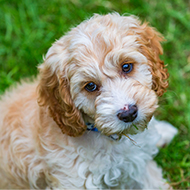Study raises concerns for the future of 'pandemic puppies'

"We encourage owners to seek out training and behaviour advice from accredited professionals" - Dr Claire Brand, RVC.
So-called 'pandemic puppies' are likely to 'carry the ghosts of their unique puppyhoods' with them into adulthood, new research suggests.
During the early 2020 phase of the COVID-19 pandemic, the UK witnessed an unprecedented increase in puppy acquisition.
In the largest study of its kind, researchers at the RVC surveyed more than 5,500 UK owners to explore the early socialisation, health and behaviour of these puppies, compared to those bought in 2019.
They found that puppies obtained in 2020 were more likely to have been ‘designer crossbreeds’, such as cockerpoos or cavapoos, compared to those purchased in 2019. They were also more likely to hold a pet passport, suggesting they may have been imported from Europe, sometimes illegally, to meet the rising demand and prices for puppies.
Researchers hope their findings, published in the journal Animals, will lead to better advice about responsible puppy buying and how to manage behavioural issues that may have arisen because of lockdown restrictions.
Dr Dan O’Neill, an associate professor in Companion Animal Epidemiology at the RVC, said: “Pandemic Puppies are such a special cohort of dogs in so many ways. Like human cohorts such as the Baby Boomers or the Millennials, these puppies of the pandemic will carry the ghosts of their unique puppyhoods during the COVID lockdowns with them into their adulthoods. This is likely to shape the dogs that they become.”
In more positive findings, the study found that the health and socialisation experiences examined did not vary significantly between puppies bought in 2019 and 2020 – a testament to owners wanting to raise their dogs well, despite the challenges posed by the pandemic.
Despite this, the findings show that puppies bought in 2020 were less likely than 2019 puppies to attend puppy training classes or to have experienced visitors to their homes.
The RVC believes the differences between the two generations of puppies could lead to behavioural problems in some pandemic puppies. For example, stranger-related fear and other behavioural problems associated with improper socialisation.
Dr Claire Brand, a researcher in canine welfare at the RVC, said: “For many of us, life over the past two years changed in countless ways due to the pandemic. During periods of the tightest restrictions, our social experiences with others outside of the home environment were greatly impacted, including those with puppies bought during this period.
“Despite many owners’ concerted efforts to raise their puppies as well as possible, some puppies missed out on key experiences of puppyhood, such as going to puppy classes or experiencing visitors in their homes. This has potential consequences for the future behaviour of ‘pandemic puppies’, and so we encourage owners to seek out training and behaviour advice from accredited professionals so that these now adult dogs can learn to live happily in our post-lockdown world.”



 The Veterinary Medicines Directorate (VMD) is inviting applications from veterinary students to attend a one-week extramural studies (EMS) placement in July 2026.
The Veterinary Medicines Directorate (VMD) is inviting applications from veterinary students to attend a one-week extramural studies (EMS) placement in July 2026.